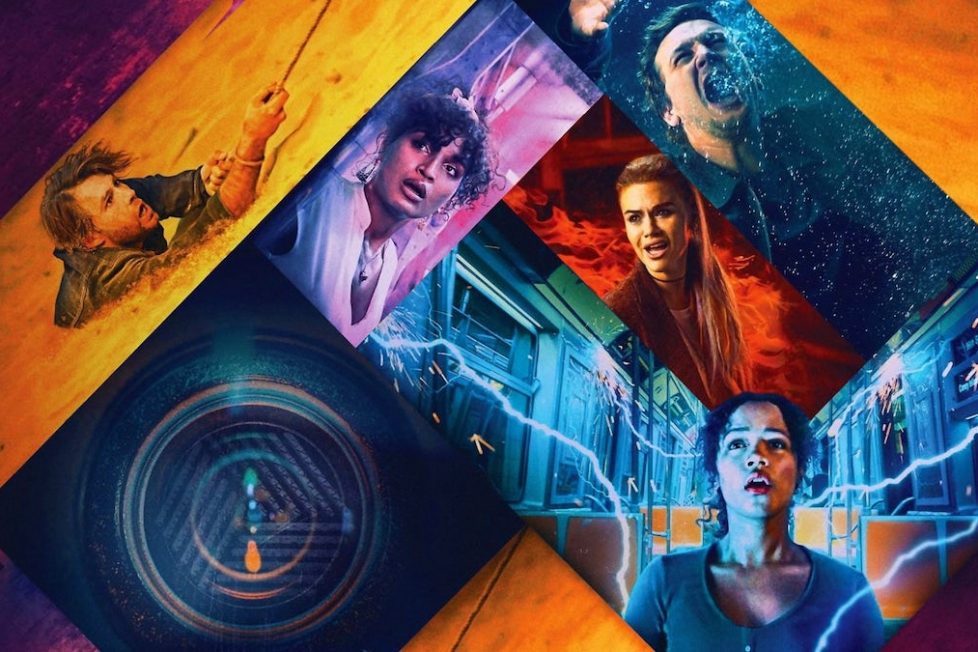ESCAPE ROOM: TOURNAMENT OF CHAMPIONS (2021)
Six people, all survivors of deadly escape rooms, find themselves forced to undergo another series of life-or-death challenges

Six people, all survivors of deadly escape rooms, find themselves forced to undergo another series of life-or-death challenges


Two years ago, the original Escape Room (2019) was an occasionally inventive but ultimately disengaging film, limited by its own high concept: a bunch of disparate strangers agree to participate in a ‘locked room’ competition where the puzzles turn out to be deadly.
Its downfall lay in the concept, as escaping from rooms was just about the only thing it allowed its characters to do. And although some of the challenges (especially the upside-down room) were vividly imagined, inevitably things became repetitive. It didn’t help that we weren’t given enough information to try solve the puzzles ourselves, and instead could only watch the characters doing so.
This tedious sequel from the same director, Adam Robitel, suffers from exactly the same problems, opening with a not-particularly-necessary and lengthy recap of the previous movie. The film then starts with Zoey (Taylor Russell), one of a few characters carried over from the 2019 film, talking to her therapist (Lucy Newman-Williams) about the trauma of her experience with the escape rooms, before deciding to drive to New York with Ben (Logan Miller)—another carry-over—to gather evidence against Minos, the mysterious corporation which apparently operates the rooms for the voyeuristic entertainment of sick, rich clients.
Inevitably, they find themselves trapped again, along with four others, in a new sequence of rooms from which they must escape. (If I overuse the words “escape” and “room”, that sums up the problem here.) The twist for the sequel is that all the participants are previous winners (nay survivors) of escape rooms, hence the Tournament of Champions suffix. Although it’s not really a tournament, as they co-operate happily from the beginning.
As before, the rooms contain clues which must be deciphered in order to open an exit before some lethal device springs into action. All the filmmaking effort has gone into the puzzles rather than their means of execution, which are relatively simple (criss-crossing lasers, acid sprays, quicksand), and at times the story seems like a mere excuse for lavish sets—notably an art deco bank.
The rooms are superbly done, but their size and complexity tends to alienate us from the narrative rather than drawing us in. We can’t uncover their secrets for ourselves, we can only passively wait for the characters to do so, and in environments so artificial there’s little suspense because it’s impossible to make any kind of informed guess about what might happen next.
And for a similar reason, the scale and elaborateness of the rooms reduces the sense of peril; in being able to construct them, Minos is clearly so powerful we have no idea whether the characters have any chance at all (only genre conventions reassure us that in any given scene, most do). Perversely, more straightforward puzzles in simpler settings might’ve worked far better.
A few sequences are successful: the concept of the first room—which the characters initially don’t recognise as being part of the game—is clever and surprising, while a later environment benefits from a threat which is repeatedly turned on and off to a clear schedule, giving the action some urgency. The score by John Carey and Brian Tyler has massive presence at high-tension moments, too, which does something to bolster the otherwise rather limited excitement.
But the writing is, at best, uneven (despite no fewer than six writers credited, but only one of them associated with the original Escape Room). A character’s nightmare is so obviously a nightmare sequence that it’s scarcely worth including, and the dialogue is banal. We don’t need to hear “they’re filling the room with water! They’re going to drown me! I can’t get out!” when we can see exactly that.
The two leads, who were among the highlights of the original, again acquit themselves well. Russell has real charisma, and Miller (who seems a wimp at first) becomes convincingly more forceful. Holland Roden’s Rachel has energy too, but the diction of actress Indya Moore as Bryanna can be difficult to understand, while Carlito Overo’s Theo is only assertive and nothing more, and Thomas Cocquerel’s alcoholic priest Nate is overly tormented. Newman-Williams’s therapist is at least persuasive in a small role.
Though it pretends to delivering a serious point with its pronouncements on exploitative rich folk enjoying the spectacle of ordinary people struggling for their lives (an idea treated more entertainingly by last year’s The Hunt), Escape Room: Tournament of Champions is, like its predecessor, nothing more than a different take on Saw (2004)—but where the torture’s more emotional than physical.
That wouldn’t necessarily be a problem if it engaged us with either the characters or the story, but we don’t get to know any of the six participants, except for Russell’s Zoey. Nor do we get to engage fully with any given scene because, again, we don’t know enough about them. And on a broad scale there isn’t any plot worthy of the name (despite a contrived late attempt to retrofit one), as it’s just people escaping from rooms and then escaping from more rooms.
The result is a film almost devoid of meaningful content, and it’s a brief relief when the ending seems to eliminate the possibility of another sequel, before restoring the likelihood at the last moment. Now that’s emotional cruelty!
USA | 2021 | 88 MINUTES | COLOUR | ENGLISH
director: Adam Robitel.
writers: Will Honley, Maria Melnik, Daniel Tuch & Oren Uziel.
starring: Taylor Russell, Logan Miller, Deborah Ann Woll & Thomas Cocquerel.
